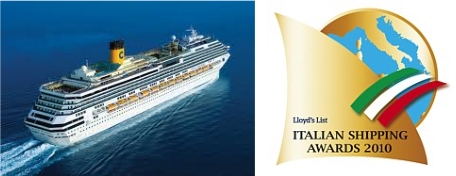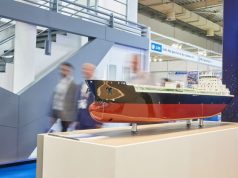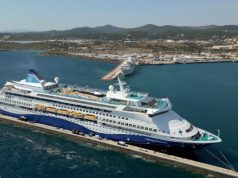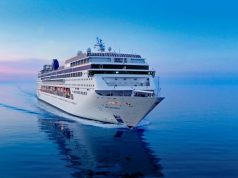 The second edition of the annual awards set up by Lloyd’s List, the leading daily newspaper for the global maritime industry, has taken place at the Maritime Terminal in Genoa, where Costa Cruises has achieved recognition for excellence in environmental protection.
The second edition of the annual awards set up by Lloyd’s List, the leading daily newspaper for the global maritime industry, has taken place at the Maritime Terminal in Genoa, where Costa Cruises has achieved recognition for excellence in environmental protection.
Costa Cruises, the largest Italian travel group and Europe’s n.1 cruise company, has won the “Achievement in Environmental Protection” at the second edition of the Italian Shipping Awards.
The awards ceremony was held last night at the Genoa Maritime Terminal at a gala evening attended by over 400 shipping industry leaders from Italy and abroad. The Italian Shipping Awards are hosted annually by Lloyd’s List, the London-based daily which is the oldest and most prestigious newspaper for the global shipping community, and were set up to recognize standards of international excellence and achievement in the Italian maritime industry. The judging panel comprised 10 international shipping experts.
Costa Cruises President Gianni Onorato, who accepted the Italian Shipping Award on behalf of the Company, said: “Environmental commitment is not just a moral priority for us, but also a corporate value that our Guests acknowledge and appreciate, so that it also becomes a strategic factor. Costa Cruises’ engagement goes beyond compliance with the albeit increasingly stringent environmental requirements; we are doing our utmost to be at the forefront in this area and our efforts are being rewarded, as confirmed by this award.”
At the inaugural edition of the Italian Shipping Awards, which took place in Naples, Costa Cruises won the “Cruises Operator of the Year” prize. This time, at the second edition in Genoa, recognition of the Company’s leadership has been extended to environmental protection, where the Italian cruise company has been a proactive player for more than 10 years now. Costa Cruises is a leader in terms of respect for the environment because it has voluntarily implemented fleetwide environmental compliance procedures that are even stricter than the mandatory provisions laid down by the (local, national and international) laws and regulations in force. This engagement is reflected in the “B.E.S.T. 4”, an integrated system of 4 different types of voluntary certification including ISO 14001, obtained from RINA (Italian Shipping Register) in 2004, as well as in the assignment of RINA’s Green Star across the fleet; this notation certifies that all Costa’s ships comply with environmental standards that are actually stricter than the prevailing provisions of the international MARPOL Convention.
Costa Cruises’ record of environmental excellence is described in its annual Sustainability Report; the next edition – due for publication before the end of the year – sets out the Company’s important results obtained in 2009, notably the following:
– a 9% reduction (compared to 2008) in fuel consumption (measured in relation to the size of the fleet and the total nautical miles sailed) with a consequent drop in CO2 produced, and a substantial fall (-24%) in greenhouse gas emissions derived from the use of refrigerants as well as a 9% decrease in the production of ozone-depleting substances.
– further success in the area of shipboard waste management with further reductions in the amount of garbage produced per day per person (about 9% less than in 2007) and in the production of special waste (-14% compared to 2008). On board the ships in the fleet, 100% of solid waste is collected separately for recycling and no special waste is ever discharged overboard. Waste recycling is a top priority and Costa promotes and supports agreements and projects to this end in the different ports of call.
The Costa fleet is among the most advanced in the world in terms of environmental design, management, compliance and energy saving. The most recent additions – the Costa Luminosa and Costa Deliziosa, together with the future flagship Costa Favolosa, under construction in the Fincantieri yard in Marghera (Venice) and due for delivery in summer 2011 – are the first vessels in Italy and among the first in the world to be equipped for “cold ironing”, namely a system whereby the ship is plugged into shoreside electrical power, enabling generators to be shut down during stopovers in port.
Costa’s commitment to social accountability and environmental sustainability has also led to the establishment of important partnerships. Costa Cruises has been an official partner of WWF (World Wildlife Fund) Italia for the protection of the Mediterranean Sea since July 2005. In 2009 the partnership was extended with the objective of setting up a network of new marine protected areas in the Mediterranean. In this connection, in July this year Costa announced that it was participating in the pilot REPCET project (the first and only cruise line in the world to take part), a reporting system aimed at reducing collisions between ships and whales while tracking their movements.
Meanwhile, since 2005 Costa Cruises has been collaborating with the Joint Research Centre of the European Commission on a new way of monitoring climate change.
Costa Cruises believes in and actively promotes responsible tourism not just on board its ships but also ashore: its shoreside excursions are also organized in accordance with this priority. In 2010 Costa is offering around 240 eco-tourism excursions, comprising visits to parks, oases and nature reserves, with programs that minimize the impact on the ecosystem and create economic opportunities for the local communities in developing areas.
The Palazzo Costa, the Italian Company’s new head office in Piazza Piccapietra, Genoa, is one of Italy’s first buildings with “zero C02 emissions on site”; this helps keep the city’s air clean while also guaranteeing reduced overall consumption and high energy efficiency with a 140% reduction in energy demand compared to a “traditional” building.












[…] Read this article: Costa Cruises votes number 1 for environmental protection at … […]